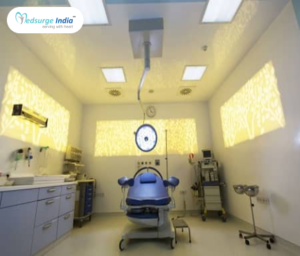Male Infertility Treatment Cost in Turkey
Unlock Exclusive Discount : Your Gateway to Premium Healthcare with Medsurge India Health Value Card.

Unlock Exclusive Discount : Your Gateway to Premium Healthcare with Medsurge India Health Value Card.


Approximately 14% of couples experience infertility, defined as the inability to conceive after a year or more of regular, unprotected sexual activity. In as many as 50% of these cases, male infertility is a contributing factor.
Male infertility may arise from several issues, including insufficient sperm production, irregular sperm function, or obstructions that hinder sperm delivery. Various factors such as medical conditions, injuries, ongoing health issues, and lifestyle choices can also influence male fertility.
Facing challenges in conceiving can be both stressful and disheartening; however, there are several treatment options available to address male infertility. Here we will delve into the cost of male infertility treatment in Turkey and the various factors that can affect its cost.
Male infertility treatment cost in Turkey starts from 2500 USD to 4000 USD. The cost can vary depending on the type of procedure and the patient’s condition.
| Cities | Prices |
| Istanbul | $3,382 to $5,500 |
| Antalya | $3,337 to $5,500 |
| Izmir | $3,300 to $5,000 |
| Ankara | $3,000 to $5,000 |
The cost of male infertility treatment in Turkey can be affected by several factors, including:
Some clinics offer package deals to help reduce costs, and it may also be advantageous to explore insurance options or payment plans.
Infertility is recognized as a medical issue that affects the reproductive system, leading to an individual’s inability to achieve conception. This condition can affect men, women, or both partners. Male infertility specifically pertains to problems within a man’s reproductive system that can obstruct the process of initiating a pregnancy with a female partner.
The terms used in this context relate to anatomical and health aspects. It is essential to apply this information effectively when discussing your healthcare needs with your provider.
Male reproductive health is influenced by several vital factors.
A man must be able to:
Sperm Disorders: Problems with the production of healthy sperm are among the most common causes of male infertility. Sperm may be immature, abnormally shaped, or lack the ability to move effectively. In some cases, sperm production may be inadequate or completely absent. Various conditions can lead to these problems, including:
Structural Issues: Blockages within the genital tract can hinder the passage of semen. These obstructions may result from genetic disorders or congenital malformations. Furthermore, infections or inflammation caused by sexually transmitted infections can disrupt semen flow. Other factors that may contribute include scar tissue from surgical interventions or varicoceles, which are enlarged veins in the scrotum.
Additional Considerations: Other aspects to consider include erectile dysfunction or premature ejaculation. Various health conditions, such as liver or kidney diseases, as well as treatments for seizure disorders, may also influence male fertility.
Your healthcare provider will review your medical history and perform a physical examination. While your primary care physician can conduct the initial infertility evaluation, it is advisable to refer you to a fertility specialist if any test results show irregularities.
Further tests for male infertility may include:
Infertility treatment is customized based on the specific causes of the condition.
Fertility Assistance: This strategy aims to support your partner in achieving conception. Available options may include:
Artificial insemination: This method involves depositing a large quantity of healthy sperm either at the cervix or directly into the uterus, enabling the sperm to reach the fallopian tubes.
IVF, GIFT, and other methods: In vitro fertilization (IVF) and gamete intra-fallopian transfer (GIFT) operate similarly to artificial insemination. Your healthcare provider will gather sperm and combine it with your partner’s eggs, either in a lab environment or within the fallopian tubes, using a significant amount of high-quality sperm.
Intracytoplasmic sperm injection: This technique entails injecting a single sperm directly into an egg, with fertilization taking place under a microscope. The fertilized egg is subsequently transferred to your partner’s uterus.
Medication: Hormonal therapies may be effective if a hormonal imbalance is contributing to infertility. Such imbalances can interfere with sperm production and may arise from issues related to the hypothalamus, pituitary gland, or testes. Treatment options could include gonadotropin therapy or antibiotics.
Surgical Procedures: Surgery might be required to resolve problems that impede sperm production, maturation, or ejaculation. For example, surgically removing varicoceles (enlarged veins in the scrotum) can improve sperm quality. Additionally, surgery may be necessary to reconnect or clear blocked tubes that are essential for sperm ejaculation.
If you have any questions or concerns about your condition, consult your healthcare provider. Male infertility can pose emotional challenges, so consider seeking professional counseling to help you and your partner cope with this situation.
Also Read:- IVF Treatment Cost in India
Male infertility is a common challenge faced by many couples globally. Although diagnosing and treating this condition can be complex, several factors may contribute to male infertility. These can range from genetic issues and hormonal imbalances to lifestyle habits and environmental factors. It is crucial for men to understand these possible causes.
If you and your partner are experiencing difficulties in conceiving, seeking professional assistance is essential. At Medsurge India, we are a leading medical tourism company that partners with some of the best hospitals and healthcare professionals around the world, including in Turkey, Malaysia, Egypt, Israel, and more.
Our goal is to ensure that your healthcare journey is seamless and stress-free. Rely on Medsurge India to simplify and make your medical experience more affordable. Remember, each case of male infertility is unique, so consulting with an expert is advisable to guide you on your journey to parenthood.
A: A male fertility test is used to determine the quantity and quality of sperm. It is sometimes referred to as a sperm analysis or semen analysis. A number of variables, such as the location, the medical professional, and any follow-up consultations needed, might affect the price of a male fertility test.
A: The Husband Semen Analysis (HSA) test is a male fertility test that looks at the quantity and quality of sperm in a sample of semen. It is among the specialist tests used to evaluate the fertility of men. The HSA test aids in assessing a number of factors pertaining to the health and functionality of sperm, as do other tests such as the Seminogram, Sperm Count Test, and Computer-Assisted Semen Analysis (CASA).
A: Lack of sperm can be caused by a hormone imbalance or an obstruction in sperm motility. Men who are infertile may produce fewer sperm than usual. Varicocele, or an enlarged vein in the testicle, is the most frequent cause of this disorder. About 40% of men who struggle with infertility have varicocele.
A: With the right medical measures, such as hormone therapy, surgery, and assisted reproductive technologies, couples can still become pregnant even if not all cases of male infertility can be completely corrected.

IVF Specialist
Gynaecologist and Obstetrician
48+ Years of Experience
Gurgan Clinic, Ankara
View Doctor
IVF Specialist
Professor
23 years of experience
Medicana International Istanbul
View Doctor
IVF Specialist
Visiting Consultant
29 years of experience
Memorial Hospitals Group, İstanbul
View Doctor
IVF Specialist
Consultant
23 years of experience
Florence Nightingale Hospital, İstanbul
View Doctor
Gynaecologist and Obstetrician, IVF Specialist
Consultant
20+ years
Medical Park Hospital, Adana
View Doctor
IVF Specialist
Consultant
16 years of experience
Medical Park Group, İstanbul
View Doctor
IVF Specialist
Consultant
13 years of experience
Medical Park Group, İstanbul
View Doctor









By using our site, you agree to our Terms and Conditions, Privacy Policy and Refund Policy. Medsurgeindia does not provide medical advice, diagnosis, or treatment. The information provided on this site is designed to support, not replace, the relationship that exists between a patient/site visitor and his/her existing physician. We also Accept International Payments.

Copyright © 2025 NSM ONLINE SOLUTIONS PRIVATE LIMITED. All rights reserved.